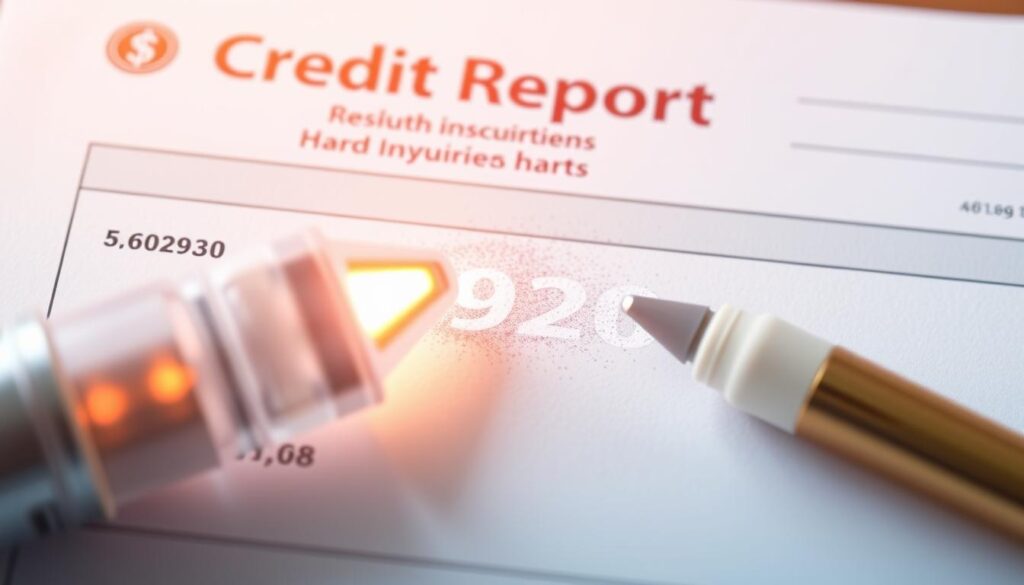A healthy credit profile is vital in today’s financial world. Unwanted credit inquiries can hurt your credit scores. Luckily, there are ways to remove these inquiries quickly and effectively.
This guide offers strategies to remove inquiries from your credit report fast. You’ll learn how to dispute unauthorized inquiries and eliminate them quickly. These methods can help boost your credit score and improve your financial health.
Key Takeaways
- Identify unauthorized or inaccurate inquiries on your credit report.
- Dispute these inquiries with the credit bureaus through formal letters.
- Leverage legal methods to remove hard inquiries from your credit report.
- Negotiate with creditors to have inquiries removed from your credit history.
- Utilize reputable credit repair services to streamline the inquiry removal process.
- Implement strategies to prevent future unauthorized inquiries on your credit report.
- Understand the positive impact of removing inquiries on your credit scores.
Understanding Credit Report Inquiries
Credit checks happen when you apply for financial products. These checks add inquiries to your credit report. Knowing how inquiries affect your credit score is vital for good credit health.
Types of Credit Inquiries
Hard inquiries occur when lenders check your credit for new applications. These can negatively impact your credit score. They show you’re seeking new credit.
Soft inquiries happen for pre-approvals, background checks, or personal credit reviews. These don’t affect your credit score at all.
Impact of Inquiries on Credit Scores
A single hard inquiry may only slightly lower your score. However, multiple hard inquiries in a short time can have a bigger effect.
Lenders see multiple inquiries as a potential red flag. It might suggest you’re in financial trouble.
To protect your score, limit credit applications. Shop for rates within 14-45 days. Credit models often count these as one inquiry.
| Inquiry Type | Impact on Credit Score |
|---|---|
| Hard Inquiry | Negative impact, typically 5-10 points |
| Soft Inquiry | No impact on credit score |
“Understanding the different types of credit inquiries and their impact on your credit score is essential for maintaining a healthy credit profile.”
Identify Unauthorized or Inaccurate Inquiries
Spotting unauthorized credit report inquiries or inaccurate credit report inquiries is key to improving your credit score. A thorough review can reveal questionable entries that may hurt your credit rating. Addressing these issues is crucial for maintaining a healthy financial profile.
Follow these steps to find suspicious inquiries on your credit report:
- Get free credit reports from Experian, Equifax, and TransUnion at AnnualCreditReport.com. You can access these once a year.
- Examine each inquiry carefully. Look for entries you don’t recognize or didn’t authorize.
- Check the date, company name, and reason for each inquiry. Note any that seem suspicious or unfamiliar.
- Compare inquiries across all three bureau reports. An inquiry on one report but not others may be inaccurate.
A detailed review of your credit reports helps identify unauthorized credit report inquiries. It also reveals inaccurate credit report inquiries that need attention. This lays the groundwork for removing these problematic entries from your credit report.
“Vigilantly monitoring your credit report is essential for maintaining a healthy credit score and protecting yourself from fraudulent activity.”
how to remove inquiries from credit report fast
Removing unauthorized inquiries from your credit report is crucial for a healthy credit profile. By disputing these inquiries, you can potentially boost your credit score. Let’s explore the process step by step.
Sending Dispute Letters to Credit Bureaus
Start by sending dispute letters to credit bureaus. Clearly outline the inaccurate or unauthorized inquiries in your letters. Include supporting documentation to back up your claim.
Keep your dispute letters clear, concise, and polite. Provide all necessary information for the investigation. This includes your contact details and the specific inquiries in question.
Following Up on Disputes
After submitting your letters, follow up on your case status. Credit bureaus must respond within 30 to 45 days. If they don’t, or if the inquiry remains, consider escalating the issue.
Be persistent in your follow-ups. Credit bureaus may overlook disputes sometimes. Keep detailed records of all communications and actions taken by the bureaus.
These records will strengthen your case if further action is needed. They can be useful for legal or regulatory proceedings.
“Removing unauthorized or inaccurate inquiries from your credit report is one of the most effective ways to improve your credit score and overall financial health.”
Removing Hard Inquiries Legally
Hard inquiries on your credit report can be frustrating. However, legal methods exist to remove them. Understanding the criteria for inquiry removal is crucial for success.
Qualifying for Inquiry Removal
To legally remove hard inquiries, prove they were made without consent. This includes cases where creditors pulled your report without authorization. Identify inquiries you didn’t initiate or know about.
Gather evidence to support your claim of unauthorized inquiries. Submit a formal dispute to credit bureaus requesting removal of questionable inquiries.
Not all hard inquiries can be legally removed. Some may result from legitimate credit applications. Review your report carefully and take appropriate steps.
- Identify any inquiries that you did not initiate or were not aware of at the time they were made.
- Gather evidence, such as documentation or statements, to support your claim that the inquiries were unauthorized or inaccurate.
- Submit a formal dispute to the credit bureaus, requesting the removal of the questionable inquiries.
| Legal Method | Criteria for Removal | Potential Impact on Credit Score |
|---|---|---|
| Disputing Unauthorized Inquiries | Inquiries made without your consent or knowledge | Significant improvement if the dispute is successful |
| Addressing Identity Theft-Related Inquiries | Inquiries resulting from identity theft or fraud | Significant improvement if the dispute is successful |
| Negotiating with Creditors | Legitimate inquiries, but creditor agrees to remove | Moderate improvement if the creditor agrees to remove the inquiry |
Understanding legal methods and taking necessary steps can help remove hard inquiries. This can improve your overall credit profile.

“Taking proactive steps to address hard inquiries can have a significant impact on your credit score and financial well-being.”
Negotiate with Creditors for Removal
Removing credit inquiries from your report can be tricky. One effective approach is to negotiate with the creditors who made the inquiries. This works well for unauthorized or inaccurate inquiries.
Successful negotiation requires a well-prepared case. Identify the inquiries you want removed. Gather documents that support your claim. These may include credit reports or correspondence.
Prepare evidence showing the inquiry was made in error. Or prove it was done without your consent. This strengthens your position when talking to creditors.
- Gather all relevant documentation and information about the inquiry you want removed.
- Contact the creditor or company that initiated the inquiry and explain your situation.
- Politely request that they remove the inquiry from your credit report.
- Be prepared to negotiate and provide a compelling argument for why the inquiry should be removed.
- Follow up with the creditor and the credit bureaus to ensure the inquiry has been successfully removed.
Negotiating with creditors requires tact. Stay professional and polite throughout your interactions. Know your rights and be ready to compromise. This increases your chances of success.
By following these steps, you can improve your odds of negotiating with creditors for credit inquiry removal. Persistence and preparation are key to achieving your goal.
“The key to successful credit inquiry removal is to approach the creditors with a well-prepared case and a willingness to negotiate.”
| Creditor | Reason for Inquiry | Outcome of Negotiation |
|---|---|---|
| ABC Bank | Credit card application | Inquiry removed |
| XYZ Telecommunications | Cell phone contract | Inquiry remains |
| Retail Co. | Store credit card application | Inquiry removed |
Utilize Credit Repair Services
Struggling to remove unauthorized credit inquiries? A reputable credit repair company can help. These specialists simplify the process and boost your chances of success.
Evaluating Credit Repair Companies
Choosing a credit repair service requires careful research. Look for companies with proven success and positive reviews. Avoid those making unrealistic promises or suggesting unethical practices.
Consider these factors when evaluating credit repair companies:
- Years of experience in the industry
- Positive customer testimonials and ratings
- Transparent pricing structure with no hidden fees
- Clear explanation of the services they provide
- Ethical and legal business practices
- Personalized approach to address your specific credit challenges
| Credit Repair Company | Years in Business | Customer Satisfaction Rating | Pricing Structure |
|---|---|---|---|
| Credit Pros | 15 years | 4.8/5 stars | $99 per month |
| Lexington Law | 20 years | 4.6/5 stars | $99.95 per month |
| Sky Blue Credit | 12 years | 4.7/5 stars | $79 per month |
Careful evaluation helps find the right partner for using credit repair services. A good company can effectively remove unwanted inquiries from your credit report.
Preventing Future Unauthorized Inquiries
Protecting your credit profile requires proactive steps. By taking precautions, you can safeguard your credit information. This helps protecting against unauthorized credit inquiries and preventing future credit inquiries.
Here are effective strategies to secure your credit:
- Regularly review your credit reports: Monitor reports from all three major bureaus. Look for suspicious activity or unauthorized inquiries. Address any issues promptly.
- Opt-out of pre-approved credit offers: Visit OptOutPrescreen.com to opt-out of pre-approved credit offers. This reduces unsolicited credit inquiries.
- Secure your personal information: Be careful when sharing personal and financial details. Protect your Social Security number to prevent unauthorized credit inquiries.
- Educate yourself on credit-related laws: Learn about the Fair Credit Reporting Act (FCRA). Understand laws that protect you from unlawful inquiries.
These proactive measures can effectively prevent future credit inquiries. They help safeguard your credit profile. Implementing them ensures a secure financial future.

Impact of Inquiry Removal on Credit Scores
Removing inaccurate inquiries from your credit report can boost your credit scores. Credit scoring models value the number of inquiries on your file. Fewer inquiries can improve your credit profile significantly.
Each hard inquiry may lower your credit score by a few points. Eliminating unnecessary inquiries can help restore your creditworthiness. Lenders often see fewer inquiries as a sign of responsible credit management.
Removing impact of credit inquiry removal on credit score can improve your credit ratings over time. This can lead to better interest rates and higher credit limits. You may also get favorable terms when seeking financing or making important purchases.

